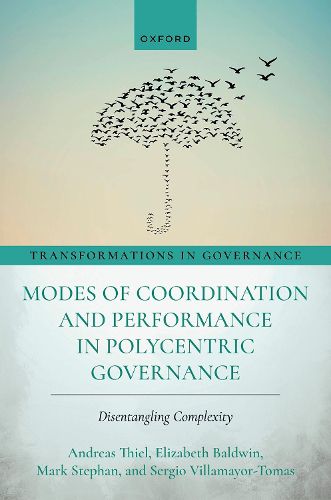Readings Newsletter
Become a Readings Member to make your shopping experience even easier.
Sign in or sign up for free!
You’re not far away from qualifying for FREE standard shipping within Australia
You’ve qualified for FREE standard shipping within Australia
The cart is loading…






Governance becomes ever more interconnected and multilevel, and polycentric governance has been developed as a lens to analyze this complexity. At an aggregate level, it explores whether multiple autonomous actors are able to coordinate across interdependent sectors, scales, and decision-making arenas. It remains unclear, however, which factors shape polycentric governance in a particular social-ecological context, and what performance results from this governance; there has been no systematic way of mapping the shape that coordination adopts in polycentric governance. This volume develops and illustrates an approach to disentangling hybrid modes of coordination in polycentric governance, its determinants and outcomes. The authors build on the Institutional Analysis and Development framework, the flagship analytical tool of the Bloomington School of institutional analysis, and on the idea of governance hybrids. They propose that polycentric systems can be systematically characterized by looking at how competitive, cooperative, and hierarchical governance solutions coexist in providing multi-level coordination among actors. The framework is applied across five empirical chapters that explore diverse cases of water, energy, infrastructure, and mining governance in the United States, Switzerland, Mongolia, and Uganda, leading to the suggestion of context-dependent types of hybrids. The analytical approach, its ontological underpinnings, and its methodological implications are further reflected in two chapters suggesting alternative perspectives on the analysis of hybrids.Transformations in Governance is a major academic book series from Oxford University Press. It is designed to accommodate the impressive growth of research in comparative politics, international relations, public policy, federalism, and environmental and urban studies concerned with the dispersion of authority from central states to supranational institutions, subnational governments, and public-private networks. It brings together work that advances our understanding of the organization, causes, and consequences of multilevel and complex governance. The series is selective, containing annually a small number of books of exceptionally high quality by leading and emerging scholars.The series is edited by Liesbet Hooghe and Gary Marks of the University of North Carolina, Chapel Hill, and Walter Mattli of the University of Oxford.
$9.00 standard shipping within Australia
FREE standard shipping within Australia for orders over $100.00
Express & International shipping calculated at checkout
Governance becomes ever more interconnected and multilevel, and polycentric governance has been developed as a lens to analyze this complexity. At an aggregate level, it explores whether multiple autonomous actors are able to coordinate across interdependent sectors, scales, and decision-making arenas. It remains unclear, however, which factors shape polycentric governance in a particular social-ecological context, and what performance results from this governance; there has been no systematic way of mapping the shape that coordination adopts in polycentric governance. This volume develops and illustrates an approach to disentangling hybrid modes of coordination in polycentric governance, its determinants and outcomes. The authors build on the Institutional Analysis and Development framework, the flagship analytical tool of the Bloomington School of institutional analysis, and on the idea of governance hybrids. They propose that polycentric systems can be systematically characterized by looking at how competitive, cooperative, and hierarchical governance solutions coexist in providing multi-level coordination among actors. The framework is applied across five empirical chapters that explore diverse cases of water, energy, infrastructure, and mining governance in the United States, Switzerland, Mongolia, and Uganda, leading to the suggestion of context-dependent types of hybrids. The analytical approach, its ontological underpinnings, and its methodological implications are further reflected in two chapters suggesting alternative perspectives on the analysis of hybrids.Transformations in Governance is a major academic book series from Oxford University Press. It is designed to accommodate the impressive growth of research in comparative politics, international relations, public policy, federalism, and environmental and urban studies concerned with the dispersion of authority from central states to supranational institutions, subnational governments, and public-private networks. It brings together work that advances our understanding of the organization, causes, and consequences of multilevel and complex governance. The series is selective, containing annually a small number of books of exceptionally high quality by leading and emerging scholars.The series is edited by Liesbet Hooghe and Gary Marks of the University of North Carolina, Chapel Hill, and Walter Mattli of the University of Oxford.